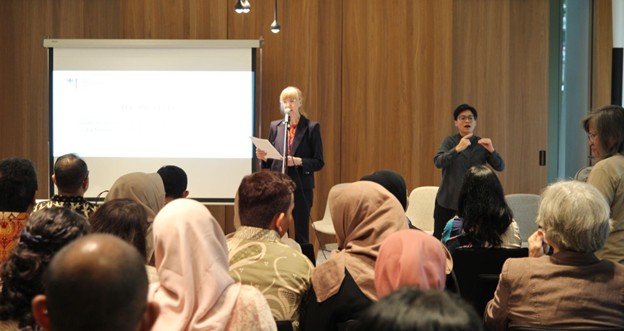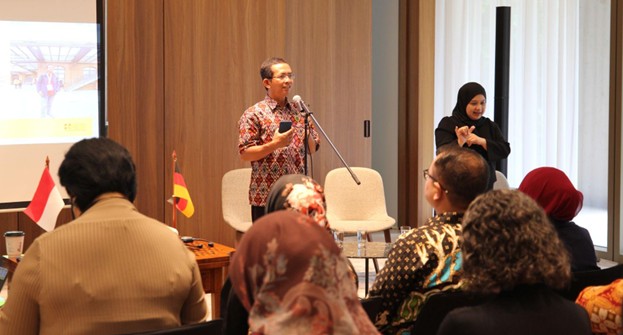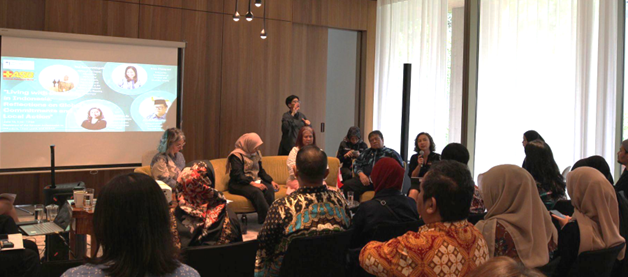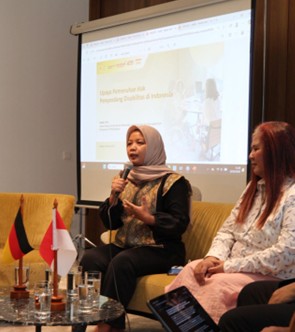The Global Disability Summit (GDS) 2025 may have concluded in Berlin, but for Indonesian stakeholders, the real work is just beginning. On June 18, a landmark Post-GDS meeting brought together government representatives, Organisations of People with Disabilities (OPDs) leaders across Indonesia, NGOs, and diplomatic missions in Jakarta to chart the path forward—from global promises to local change. Organised by the German Embassy in collaboration with Arbeiter-Samariter-Bund (ASB) South and South-East Asia, this meeting marked a significant turning point in transforming global commitments into actionable efforts for disability inclusion in Indonesia.
Global Promises, Local Challenges

In her opening, Her Excellency Ina Lepel, the German Ambassador to Indonesia, emphasised that the sustained collaboration beyond the GDS itself is crucial. This was followed by a presentation from Rani Sawitri, representing ASB South and Southeast Asia, who outlined key takeaways from the summit and introduced the Amman-Berlin Declaration. The declaration reinforces the global commitment of “15% for the 15%”—a target to ensure that persons with disabilities, who comprise approximately 15% of the world’s population, are fully included across all sectors of development. Adding a grounded perspective, Kasih, an OPD representative from Magelang and a GDS delegate, highlighted how global events like the GDS can empower OPDs, expand their advocacy reach, and strengthen their legitimacy in policy spaces.

Yet participants, including Perkumpulan Jiwa Sehat (PJS), voiced concerns: limited dissemination of GDS information at the national level and the absence of key topics like legal capacity, social protection, and de-institutionalisation. Concerns were also raised over diminishing donor support, particularly following USAID’s withdrawal. These gaps underscores the urgent need to strengthen domestic funding and ensure sustainability.
Nothing Without Us: OPDs-led Efforts

A panel discussion titled “Living with Disability in Indonesia: Global Commitments, Local Action” offered a compelling and multifaceted reflection on the state of disability inclusion in Indonesia. This dialogue highlighted both systemic gaps and emerging opportunities. It underscored the meaningful participation of OPDs that must be central to any inclusive development agenda.
Chrysant Lily Kusumowardoyo, Regional Director of ASB South and Southeast Asia, set the tone:
“OPDs must be meaningfully involved from the very beginning of any programme design process, not as afterthoughts. They are the central actors in shaping inclusive interventions.”
She reaffirmed ASB’s commitment to inclusive programming based on the 5 Inclusion Musts: disaggregated data, accessibility, capacity development, meaningful participation, and rights. Still, she acknowledged a persistent challenge that OPDs are being sidelined especially in high-level policy discussions.
Joana Damanik of the National Commission on Disability (KND) shared that while Indonesia has not yet endorsed the Amman-Berlin Declaration, KND is actively facilitating dialogue with key ministries to push for stronger alignment between international agreements and local action.
“Indonesia’s strong culture of collaboration,” he noted, “is a foundation we can build on to ensure that no one is left behind.”
Rina Prasarani, Chairperson of the Indonesian Association of Women with Disabilities (HWDI), shared her lived experience as a woman with visual impairment, highlighting the stigma, discrimination, and inaccessible education. Those barriers reflect broader structural and social challenges for persons with disabilities in Indonesia. Building on her experience, Rina raised a critical concern: the inaccessibility and inflexibility of funding mechanisms for OPDs. OPDs often face significantly greater challenges in accessing resources:
“We need funding systems that are flexible, inclusive, and grounded in the actual needs of OPDs. That’s where the ‘15% for the 15%’ must begin.”

Dwi Rahayuningsih, representing Bappenas, emphasised the need for strategic prioritisation across ministries
“A key challenge of this effort is the lack of harmonised disability data across institutions, which hampers effective planning,” she shared.
To respond, Bappenas has integrated 45 disability inclusion indicators into the National Medium-Term Development Plan (RPJMN), and requires ministries to implement inclusive policies, such as the allocation of civil servant (CPNS) positions for persons with disabilities. Dwi further affirmed Bappenas’s role in overseeing the National Action Plan on Disability (RAN-PD) to ensure accountability in protecting the rights of persons with disabilities.
What Comes Next: Making Inclusion Real
The Post-GDS Coordination Meeting served as a critical platform to bridge OPDs with national-level policymakers, and to begin closing long-standing barriers in access, participation, and funding. Yet the GDS and its follow-up are not end points. They serve as catalysts for action. To achieve the “15% for 15%” target, structural change, inclusive financing, and a commitment to recognising OPDs as active agents of change—not passive recipients—are essential. As Indonesia moves forward, ASB and the German Embassy in Indonesia call on government agencies, donors, civil society, and the public to transform these shared commitments into concrete action. Let’s work together to ensure that no one is left behind.
(Author: Brigitta Shinta Dhea Pinastika).

